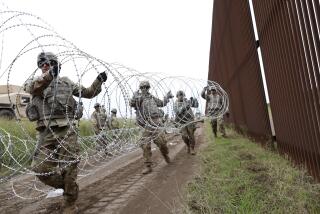Bosnia: Political Clock Is Ticking for Clinton : Airlift marks a time of growing pressure for administration
- Share via
The U.S. Air Force has started its shuttle into Bosnia, big C-130 transports, their wing markings blurred with white paint, flying supplies from the American air base at Ramstein, Germany, to a long concrete ribbon in Tuzla. There, in northeast Bosnia, the buildup is beginning, the commitment of U.S. soldiers and airmen to keep a tenuous peace in a distant country that few Americans had heard of five years ago. On Thursday in Paris, the leaders of Bosnia, Serbia and Croatia are scheduled to sign a treaty ending the horrors of ethnic war in the Balkans. The political clock has already begun ticking on President Clinton’s decision to send Americans in harm’s way.
RISK ON TWO LEVELS: Clinton acknowledges that American casualties are to be expected. He is aware of the political risk too. That concern was underlined last week when nearly half the members of the House signed a letter to him bearing a short, simple message: “We urge you not to send ground troops to Bosnia.” This newspaper has supported the president’s decision. The United States, as the leader of NATO, could not draw back from its commitment to enforce the peace that its diplomats achieved, that its warplanes helped induce and that its humanitarian ideals demand.
Nevertheless, the race against the calendar has started. The White House and the Pentagon estimate that American forces will be needed on the ground in Bosnia for a year once the NATO army reaches full strength of 60,000, perhaps two months from the signing of the peace treaty. The U.S. component will be about 20,000.
But no one knows when the job will be done. The goals are to keep the guns silent while Bosnia’s players--Muslims, Serbians and Croats--establish through elections and consultations the realignment of political authority in the country. Bosnia will remain a single country but will be divided into two constituent halves, one a Muslim-Croat confederation, the other Serbian, and both surmounted by a national government that will deal with foreign affairs and similar matters. Sounds doable.
However, the political model is already under attack, despite having been adopted by the Bosnian, Serbian and Croatian presidents in Secretary of State Warren Christopher’s feet-to-the-fire talks in Ohio. And the military and social problems are immense. More than a quarter of the Bosnian population--members of all ethnic groups--have been displaced by the four-year war. People are living in camps, open fields. Families are scattered. The guns are silent but not holstered. The situation, at this point, does not seem to be one that can be resolved in a single year, if it can be resolved at all. Where will things stand when Clinton’s year passes?
AN ISSUE OF VIRTUE: The deployment will be difficult from the start. Already the city fathers of Tuzla, the American headquarters, are wringing their hands about the welfare of their daughters with GIs coming to town. In Sarajevo, Serbs in the suburbs are refusing to leave the city for the safety of Serb-held territory to the east.
There also remains the explosive issue of outside Muslim fighters who came to the aid of their Bosnian co- religionists. Washington wants them out. These Iranian, Afghan and other moujahedeen are an obvious danger to Western peacekeepers, particularly the Americans. But a timely departure appears unlikely.
It seems to us that Clinton will not be able to keep to a one-year timetable, perhaps not even come close. But the target should remain. The United States and its NATO allies might be able to keep the peace, but the Muslims, Serbs and Croats must solidify it. That is not NATO’s job, nor America’s. We should give them aid and encouragement, but for not much more than a year. The Europeans could stay longer. An example will have been set.
More to Read
Get the L.A. Times Politics newsletter
Deeply reported insights into legislation, politics and policy from Sacramento, Washington and beyond. In your inbox twice per week.
You may occasionally receive promotional content from the Los Angeles Times.










